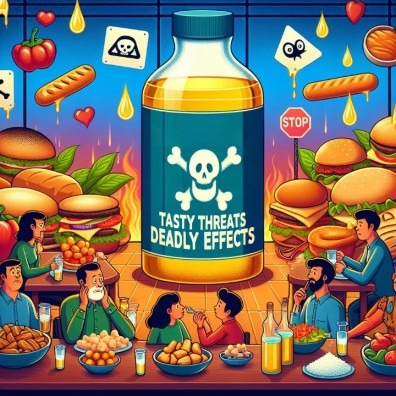
Beyond the Radiant Facade: The Hazards of Fully Hydrogenated Oil
Feb 24, 2024
The Silent Ingredient: An Introduction
Fully hydrogenated oil is a staple in the food industry, often unnoticed in our vast array of processed foods. This ingredient is critical in determining the texture, taste, and longevity of products on our shelves. Yet, its ubiquitous presence belies the significant health implications it carries, which are frequently overlooked by consumers and regulators alike.
In this comprehensive examination, we will dissect the role of fully hydrogenated oil, employing the latest data and tangible examples to illuminate its potential hazards. This oil is a crucial player in the food sector, employed to stabilize oils and extend the shelf life of processed items. It converts unsaturated fats into a more solid form, often replacing saturated fats such as butter.
Despite its functional benefits, fully hydrogenated oil is not without controversy. The hydrogenation process can lead to the creation of trans fats, notorious for their adverse effects on cholesterol levels—raising low-density lipoprotein (LDL), the “bad” cholesterol, and lower high-density lipoprotein (HDL), the “good” cholesterol, thus amplifying the risk of coronary heart disease.
Beyond cardiovascular concerns, recent research has broadened the health risks associated with fully hydrogenated oils, implicating them in issues such as insulin resistance and systemic inflammation. These oils are stealthily embedded in many everyday food items, from pastries to packaged snacks, highlighting consumers’ need to be vigilant and discerning when reading food labels.
While the industry has been pivoting away from fully hydrogenated oils, moving towards healthier alternatives like mono- and polyunsaturated fats, this transition is a work in progress. Regulatory measures have mandated the explicit labelling of trans fat content, equipping consumers with the knowledge to make healthier dietary choices.
Despite these advancements, the prevalence of fully hydrogenated oil persists, underscoring an ongoing necessity for consumer awareness. As we navigate the complex terrain of contemporary food choices, we must recognize the potential health implications of even the most inconspicuous ingredients in pursuit of a more informed and health-conscious society.
Fully Hydrogenated Oil: The Hidden Reality
Fully hydrogenated oil, a product of vegetable oil hydrogenation, is a common food industry ingredient that enhances shelf life and stability. This process involves saturating vegetable oil with hydrogen under specific conditions, transforming it into a solid or semi-solid state. This alteration is beneficial for maintaining the consistency of processed foods and preventing spoilage.
However, the creation of trans fats during hydrogenation has raised health concerns. Trans fats are associated with increased bad cholesterol (LDL) levels and decreased good cholesterol (HDL) levels, heightening the risk of heart disease. Despite their practical use, the negative health impacts of trans fats have led to scrutiny and regulatory action.
The presence of fully hydrogenated oils in everyday foods—from snacks to baked goods—highlights the importance of consumer awareness. With the industry shifting towards healthier fats and clearer labeling, consumers now have more information to make informed choices. Yet, the prevalence of fully hydrogenated oils in the market underscores the need for continued vigilance in dietary habits.
The Mass Psychology of Convenience
The mass psychology of convenience goes beyond a simple desire for quick fixes. It’s a complex interplay of factors that have reshaped how we view and engage with food. The hustle and bustle of daily life have driven the shift towards processed and convenience-driven options, where time has become a precious commodity. Fully hydrogenated oil, with its ability to prolong the life of processed foods, aligns seamlessly with this modern ethos of efficiency and immediacy.
The rise of fully hydrogenated oil in the food industry is tied to our collective quest for convenience. This ingredient, often listed as “hydrogenated vegetable oil,” responds to the demand for longer-lasting and stable food products suitable for the fast pace of modern life. While it extends shelf life and maintains food structure, it also introduces health concerns due to its transformation into saturated fats during hydrogenation.
The widespread use of fully hydrogenated oil reflects a broader trend towards time-saving food options, aligning with the societal shift towards efficiency. However, this shift has implications for consumer health, as these oils can contribute to increased levels of bad cholesterol and heart disease risk. The challenge lies in balancing the convenience of processed foods with the need for healthy dietary choices, as these oils often go unnoticed on ingredient lists.
Understanding the impact of the mass psychology of convenience on our eating habits requires delving into the social and psychological drivers behind our dietary decisions. The craving for instant gratification and the necessity for time-efficient solutions create fertile ground for the seamless integration of fully hydrogenated oil into our daily diets. It silently participates in the collective narrative of our hurried breakfasts, on-the-go lunches, and quick-fix dinners.
Rethinking the Norm: The Role of Contrarian Views in Nutrition
Contrarian thinking in nutrition doesn’t just question the status quo—it actively challenges it. This approach is particularly relevant when examining the widespread use of fully hydrogenated oil, an ingredient once deemed harmless. By adopting a contrarian stance, we can better understand the implications of such ingredients in our diet.
Sceptics scrutinize the food industry’s promotion of fully hydrogenated oil, which is lauded for its ability to preserve food and enhance shelf life. Contrarians prompt us to weigh these benefits against the potential health costs, questioning if the convenience is worth the risk.
The contrarian perspective is not merely opposition for its own sake; it calls for a deeper evaluation of the trade-offs between industry benefits and public health. As research uncovers the adverse effects of trans fats—often a byproduct of hydrogenation—on cardiovascular health, insulin resistance, and inflammation, the contrarian’s voice grows louder, urging a reevaluation of our food choices.
Embracing contrarian views can lead to a shift in consciousness, where health considerations precede the practicality of mass-produced convenience foods. This mindset encourages us to look beyond immediate gratification and consider the long-term impacts of our dietary habits.
Examining the Heart Disease Connection: Fully Hydrogenated Oils and Trans Fats
Studies have consistently shown a link between the consumption of fully hydrogenated oils and an increased risk of heart disease. The hydrogenation process, which solidifies vegetable oils, inadvertently produces trans fats. These trans fats are known to elevate LDL (bad) cholesterol and decrease HDL (good) cholesterol, disrupting the body’s cholesterol balance and contributing to the development of arterial plaque.
Research from the 1990s onwards has provided evidence of the health risks posed by trans fats. A 1990 Dutch study demonstrated that trans fat consumption adversely affects cholesterol levels. A 1993 Harvard study found that replacing just 2% of energy from trans fat with unsaturated fat could reduce the risk of coronary heart disease by about one-third. The FDA’s 2015 determination that partially hydrogenated oils are not generally recognized as safe was based on extensive research into the effects of trans fats.
The American Heart Association recommends reducing trans fat intake to lower LDL cholesterol and suggests replacing trans fats with monounsaturated or polyunsaturated fats. The FDA has taken steps to remove partially hydrogenated oils from processed foods, which could prevent thousands of heart attacks and deaths each year.
Understanding the relationship between fully hydrogenated oils, trans fats, and heart health is crucial for making informed dietary choices and mitigating the risk of cardiovascular disease.
Case Study: The Impact on Metabolic Health
Case Study: The Role in Inflammatory Diseases
A 2021 study has identified a link between fully hydrogenated oil consumption and increased inflammation, which can lead to diseases such as rheumatoid arthritis and inflammatory bowel disease. The trans fats in these oils are shown to elevate inflammatory markers, even when accounting for other dietary and lifestyle factors.
Trans fats are known to disrupt the body’s inflammatory processes, which are typically protective responses to injury or infection. Chronic inflammation triggered by diet can contribute to the development of autoimmune disorders and negatively affect gut health. This study emphasizes the need to reevaluate the inclusion of fully hydrogenated oils in our diets due to their potential impact on inflammatory diseases.
Navigating the Future of Food: The Imperative for Ingredient Transparency
A growing demand for transparency in food labelling is shaping the future of food. Consumers assert their right to know what’s in their food and the potential health effects of those ingredients. This movement is not just about access to information; it’s about empowering consumers to make informed choices that align with their health and values.
The focus on fully hydrogenated oils highlights the need for clear labelling. These oils, often hidden behind various names, have been linked to adverse health outcomes, and consumers are calling for the ability to identify and avoid them quickly.
Transparency in the food industry is critical to consumer trust and loyalty. People are seeking out products with simple, recognizable ingredients and are more attentive than ever to the information on food packages. They want to know not only what is in their food but also where it comes from, how it’s made, and the sustainability of these practices.
The call for transparency is an opportunity for the food industry to connect with consumers deeper, fostering a relationship based on trust and shared values. This trend will likely continue shaping the industry as we move forward, with transparency at the forefront of consumer demands.
Conclusion: Unmasking the Risks of Fully Hydrogenated Oils
Our exploration into the world of processed foods has revealed the hidden risks associated with fully hydrogenated oil. This ingredient, often slipped into our diets under various guises, has been linked to a range of health concerns, from heart disease and metabolic disorders to inflammation, cognitive decline, and obesity. The evidence suggests that the trans fats found in fully hydrogenated oils are the primary culprits behind these negative health outcomes.
The transformation of vegetable oil into its fully hydrogenated form is a process designed to improve shelf life and stability, yet it significantly alters the oil’s molecular structure. This alteration has been shown to have detrimental effects on our health, challenging the perception of fully hydrogenated oil as a benign food additive.
The demand for transparency in food labeling is a response to these concerns, reflecting a growing consumer desire to make informed dietary choices. As we look to the future, it is clear that the food industry must prioritize clear labeling practices to allow consumers to avoid ingredients that may harm their health.
In summary, the case against fully hydrogenated oil is compelling. Armed with knowledge of its potential dangers, consumers are better positioned to make choices that protect their health and well-being. The once-hidden hazards of fully hydrogenated oil are now in the spotlight, prompting a critical reevaluation of its place in our food supply.
Mindful Escapes: Nurturing Intellect and Soul
Mind Control Techniques: Mastering Market Dynamics for Success










